
The Week
The seven days of creation constitute a week and is called Shavua (which literally means “a period of seven”) – from the Hebrew word for seven (Sheva), thus, Shavua could mean seven days or seven years. So, we have to be careful to look for the meaning of the word in its context.
For example, Genesis 29:27 reads: "Fulfill her period of seven (Shavua), and we will give you this one also for the service which you will serve with me still another seven (Sheva) years." In this passage Laban asks Jacob to complete Leah’s seventh year, the period of seven years, and then work another seven years for Rachel.
But in another passage, Exodus 34:22, this Shavua refers to a period of seven days: "And you shall observe the Feast of Weeks (Shavua), of the first-fruits of wheat harvest, and the Feast of Ingathering at the year's end.” This passage refers to the holiday of Shavuot, the seven periods of seven days, or seven weeks.
And again in Daniel 9:24-27 the passage refers to “a period of seven” (Shavua), which in context means "of years": "Seventy periods of seven (Shavua) are decreed upon your people and upon your Holy City, to finish the transgression, and to put an end to sin, and to atone for iniquity, and to bring in everlasting righteousness, and to seal up the vision and prophecy, and to anoint the Most Holy. Know therefore and understand, that from the going forth of the command to restore and to build Jerusalem until the coming of Prince Moshiach shall be seven periods of seven (Shavua); then for sixty two periods of seven (Shavua) it shall be built again, with squares and moat, but in a troubled time. And after sixty two periods of seven (Shavua) Moshiach shall be cut off and nothing will be to Him; and the people of a prince who shall come shall destroy the City and the Sanctuary; and its end shall be with a flood, and to the end of the war desolations are decreed. And he will make a firm covenant with the many for one period of seven (Shavua), but in the middle of the period of seven (Shavua) he will put a stop to sacrifice and grain offering..." This is a difficult passage, but knowing the meaning of Shavua it can become a bit clearer.
From Shabbat to Shabbat constitutes a week. The week is totally an abstract concept taken from the biblical account of creation. There is no celestial observance that can determine the passing of the week. Therefore, the observance of the seven-day week is one of the most intriguing world wide calendar observances because its implication is that there was one authoritative source, the religion of the Jews, which spread and influenced other cultures. It implies that there is a God who created this universe and every passing week attests to that.
When we meet as Messianic believers and worship God on Shabbat, the seventh day, we attest - by following this cycle of the days of creation – not only of the existence of God, but also of His creation. We attest that we believe in the veracity of the Bible. I will not debate as whether these days were literally, figuratively or symbolically seven days; they could have been seven millennia from a time warped dimension, but to God were but seven days. Psalms 90:4: “For a thousand years in Your sight are but like yesterday when it is past, and like a watch in the night.” and 2 Peter 3:8: “Chaverim, let not this one thing escape your notice, that a thousand years in the eyes of Yehovah is like one day and one day like a thousand years.”
Therefore, our week follows a pattern of six working days and then comes the Shabbat, the most holy of days, because God blessed it and in which He created the spiritual world and was refreshed in His physical created world.
The new week begins after the Havdallah (separation) prayer on Saturday night after the appearance of three stars in the sky, about an hour after sundown – and we wish each other a Shavua Tov, a Good Week.
|


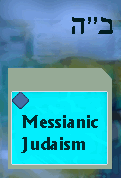 Is Messianic Judaism Biblical Judaism?
Is Messianic Judaism Biblical Judaism? 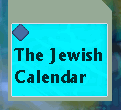 What is the Jewish Calendar?
What is the Jewish Calendar?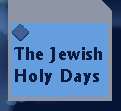 The Jewish Holy Days are the seven God's Holy Days.
The Jewish Holy Days are the seven God's Holy Days.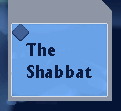 The Shabbat is the seventh day which God sanctified and set apart for worship.
The Shabbat is the seventh day which God sanctified and set apart for worship.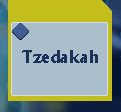 Tzedakah, the righteous giving.
Tzedakah, the righteous giving.